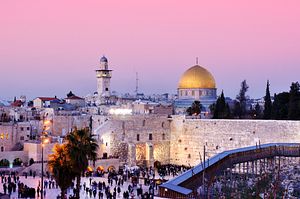As a nation with the largest Muslim population in the world, Indonesia is not known for its close ties with Israel. Yet while publicly associated with a pro-Palestinian stance, Indonesia quietly enjoys a cordial relationship with the Jewish state.
Although kept largely out of the public eye, the two countries began to interact with each other soon after the establishment of the State of Israel in 1948. The relationship was initially very limited, at least until the New Order regime of President Suharto found it worthwhile to begin dealing with the Israelis, particularly in the military realm. It was then during the post-Suharto era of Abdurrahman Wahid that ties began to gradually expand. Since then, there have been a series of high-rank visits between Jakarta and Tel Aviv. The then Israeli Prime Minister Yitzhak Rabin visited Indonesia in 1993, and in the following year Wahid was invited by Shimon Peres to Jerusalem to witness the peace agreement between Israel and Jordan.
These visits continued in the coming years. Critics from Islamic organizations such as Muhammadiyah did not stop Wahid from returning to Israel in 1997 or from receiving Israeli delegations.
Although the two countries maintain no official diplomatic relations, trade relations between Indonesia and Israel have grown in recent years. Trade between Jakarta and Tel Aviv have reportedly reached $400-500 million, almost 88 percent of which is Indonesian exports. While Indonesia mainly ships commodities, Israel’s exports are primarily high-tech products.
There has also been some investment. In 2000, for example, Indonesian insurance firm Asuransi Jasindo signed an agreement with Assure Limited of Israel to offer export credit insurance for exporters and importers from the two countries. The agreement also led the company to open a representative office in Israel. Other companies such as Bakrie Group also reportedly have links to Israel.
In addition, the two countries have also established organizations, albeit unofficial, that aim to bolster ties. The Indonesia-Israel Public Affairs Committee (IIPAC) was created in 2002 with the assistance of an Indonesian Jew who was studying in Israel, Benjamin Kentang. Kentang, a former member of the Islamic body Nadhatul Ulama and the Indonesian Muslim Student Association, founded the IIPAC following his return from Israel where he studied with the help of a scholarship from President Wahid.
Even though IIPAC was originally founded in 2002, it remained largely out of the public eye until it was launched in 2010 in Jakarta. According to Indonesian outlet Detik, IIPAC has around 4,450 members. It has also led to the creation of the Indonesian Business Lobby, which aims to facilitate Israeli investment in the country.
To facilitate the growing partnership, the Israel-Indonesia Chamber of Commerce was established in Tel Aviv in 2009. This organization is a subsidiary of the Israel-Asia Chamber of Commerce and aims to strengthen the Indonesia-Israel economic partnership despite the absence of diplomatic offices in both countries. It seeks to promote investment initiatives and advantages between the two countries by providing advice and support to investors and businessmen. Although it is difficult to find data that might indicate the extent to which these bodies have contributed to the Indonesia-Israel ties, doubtless the initiatives can contribute to deepening contacts among businessmen, investors, and perhaps even politicians.
In more recent years, Jakarta-Tel Aviv cooperation has expanded into different realms. In 2008, for instance, the Indonesian government signed an agreement with Israel’s national emergency service Magen David Adom (MDA) and the American-Israel Joint Distribution Committee to provide medical training to paramedics in Indonesia. One remarkable aspect of this agreement was that Indonesia was represented by the Islamic organization Muhammadiyah. People-to-people relations have gradually grown over the years as well. It is estimated that around 200,000 Indonesian tourists visit Israel each year. Several tourism agencies have even started to offer package tours. These exchanges may well expand in the years to come. In fact, the Indonesian government is reportedly planning to use Israel’s advanced technology and manpower to build roads in the country’s easternmost province of Papua.
High-level visits have also continued. In 2013, for example, Israel’s minister of economy visited Indonesia to attend the World Trade Organization Conference in Bali. Some years earlier, Shimon Peres traveled to Indonesia in 2000 as minister of regional cooperation. In addition, the Deputy Director-General for Asia and the Pacific at the Israel’s Foreign Ministry Amos Nadai and Israeli Ambassador in Bangkok Yael Rubinstein attended a convention organized by the Economic and Social Commission for Asia and the Pacific in Jakarta. Nor has this been a one-way exchange. Several Indonesian delegations have also made their way to Israel. In 2013, for example, a group of high-ranking Indonesian delegations made a secret visit to the Knesset, and last year Indonesia also attended Israel’s Homeland Security convention held in Tel Aviv.
Ties between Indonesia and Israel may well remain quiet in the years to come. Certainly, if the relationship does become more open, Indonesia is likely to face pressure from domestic Islamic groups and even the general public. Thanks to social media, Israel’s brutal occupation of Palestine is now widely known in Indonesia. If bilateral relations become more public, the government in Jakarta could well come under fire, given Indonesia’s public support for the Palestinian cause. There could also be repercussions for Indonesia’s standing in the Muslim world and for its growing ties with Arab countries.
Muhammad Zulfikar Rakhmat has lived in the Middle East for seven years. He holds a B.A. in International Affairs from Qatar University and is currently pursuing an M.A. in International Politics at the University of Manchester.













